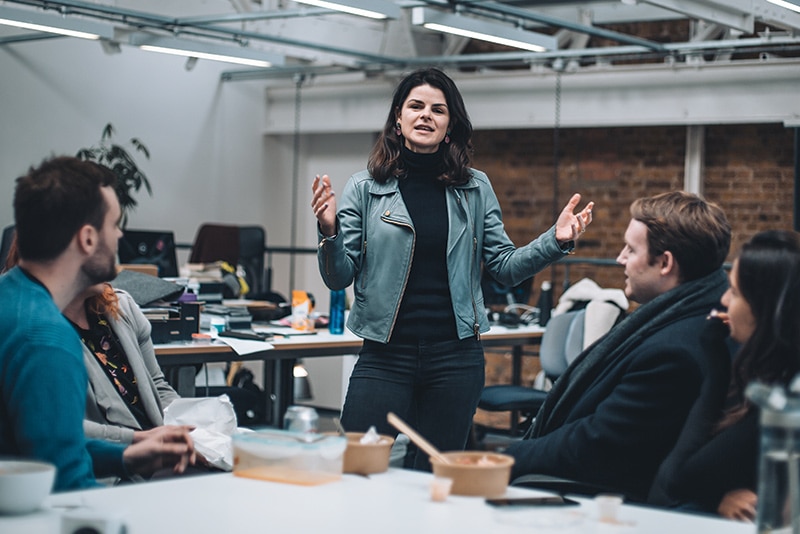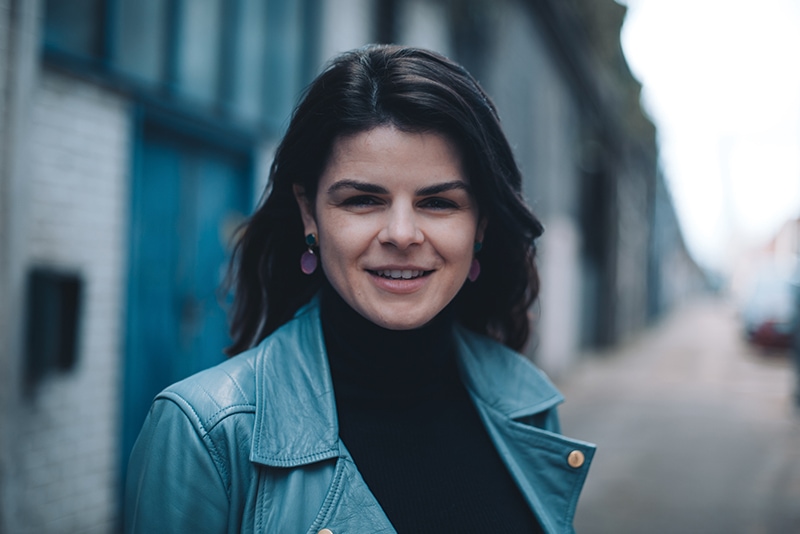Why Alice Bentinck Believes that Every Start-Up Should Have a Co-Founder

An outlier by nature and innovator by trade, Alice Bentinck made her name by disrupting the status quo and choosing the path less trodden—at times to her own astonishment. Growing up in the countryside with nine goats in New Forest, England, the Briton had always imagined herself taking care of animals for a living, until she found herself in business school. An unexpected denouement which remained far from where she was meant to be. Two years flew by as she devoted her life to McKinsey & Company as a consultant, hoping to climb the career ladder like everyone else and one day become a founder herself. Only after realising the corporate grind does nothing to prepare one for entrepreneurship did Alice finally make the decision to start her own company in 2011. With a singular goal in mind, Alice went on to establish Entrepreneur First at the age of 25, with co-founder Matthew Clifford—and has never looked back since. In 8 years, Entrepreneur First has become the world's leading talent investor with offices in six locations around the world: London, Berlin, Paris, Singapore, Hong Kong, and Bangalore. Their distinct approach can be attributed to a leftfield model that identifies talents who have “nothing”—no business idea, no co-founder, no team, but massive reams of potential—and grooms them to build successful start-ups. Unlike most venture capital firms that invest in start-ups that have done the groundwork, Entrepreneur First funds individuals with immense untapped talent, matchmakes them with a compatible co-founder, and equips them with the tools to create something worthwhile from scratch. A pioneer in the venture capital arena, Alice believes the success of any start-up hinges on its people. When 90% of all ideas fail, it’s far more ambitious to focus on the people behind those ideas instead. People who have the grit and ability to execute a vision, scale a team, and take a product to market. So far, it has proven to be a game-changing formula, having created more than 200 companies with a collective worth of US$1.5 billion. One of Entrepreneur First’s chief runaway successes, Magic Pony, caught the eye of Twitter and was sold for an astounding US$150 million in a short one and a half years after its founders met. Backed by LinkedIn’s Reid Hoffman, the Best European Startup Accelerator of 2016 and 2017 (accolades it earned at The Europas) hopes to influence more non-traditional investment models to look beyond and recognise the value of human talents that drive the success of start-ups.
ANGELA LOW: Do you think we’re currently in a tech or start-up bubble?
ALICE BENTINCK: We don’t believe in a tech or start-up bubble, having not seen signs of a slowdown in the market. In fact, in cities where we have a presence, we believe that the tech and start-up scene is just starting to flourish. The best technical talent is increasingly considering building a company as a first-choice career option. More fundamentally, we believe that the most ambitious people are drawn to impact, and tech entrepreneurship gives them the chance to do that at scale. While there may be short-term fluctuations in the market, we are confident that the trend of building a globally significant tech company is here to stay.
ANGELA: How has the start-up scene in London evolved since you co-founded Entrepreneur First (EF)?
ALICE: London has matured significantly since EF first started. We’ve observed two important trends that have contributed to this shift—an increase in the quantity and quality of seed capital, as well as a growing number of individuals looking to build companies. When we began in 2011, we had to convince the most talented individuals that starting a company was a first-choice career and a way of creating impact. This has since become a much more widely understood path for today’s innovators.
ANGELA: How about Singapore? In the last three years that Entrepreneur First has been in Singapore, how has the start-up and tech climate here changed?
ALICE: We see more momentum and government support for the start-up and tech scene now. Singapore is a great place for us to be because it’s taking the lead in investing in local AI capabilities and digital programmes. The government, in its Budget 2019 announcements, also reinforced its commitment to the start-up ecosystem with the Scale-up SG and Innovation Agents Programme. One of our key partners, SGInnovate, is also playing an important role in the start-up and tech scene by investing in EF companies.
ANGELA: How important is it to fund ideas, when 90% of them are likely to go nowhere?
ALICE: Instead of ideas, we believe that it’s more important to invest time and money into people. Talent is our lifeblood. We take the focus away from ideas and start-ups, and invest in exceptional individuals themselves. We call this Talent Investing. While some potential founders come to us with ideas, many of these ideas are just a starting point. What’s more important is for people to identify their edge—a secret weapon typically in the form of a technical skill or area of expertise. Identifying and developing an edge is more crucial than having an idea. It becomes an individual’s personal competitive advantage and the starting point for the idea. An idea, no matter how good, is likely to change and morph as the founder gets more information from speaking to customers.
ANGELA: That’s one of the most intriguing aspects of Entrepreneur First—funding individuals, regardless of whether they have a team or even an idea. How do you determine how much potential a person has to be a successful founder? What are some things you look for, and how quantifiable are they?
ALICE: When looking through applications, I look out for people who constantly question the status quo, and risk-takers who have taken alternative paths throughout their lives. I also look out for contrarian thinkers who are not only intelligent, but are unbelievably motivated to start their own company. If an applicant is smart, skilled and motivated, they would probably make a good founder. Lastly, entrepreneurship requires dedication. I look for people who define themselves by their work and want to dedicate their lives to it.
ANGELA: What does the process of identifying suitable potential founders look like? Do you follow a formula, or is it more free-flowing?
ALICE: EF assesses each potential founder on an individual basis as part of the application process. While reviewing each application, we ask ourselves if this person has what it takes to build a high-growth tech start-up from scratch. This question drives EF because we accept individuals into our programme usually before they have a co-founder or an idea. All we have to go on is each individual’s potential to form a world-changing company. After creating over 200 companies, what we’ve seen time and again is that successful founders tend to have four qualities in common. They are smart, skilled, insightful and committed.
Not one of these criteria alone is enough to get into the cohort. Even founders who demonstrate all of these attributes may face significant—often fatal—obstacles in building their companies. However, an individual who demonstrates these qualities has the best chance of being selected for the EF programme.
ANGELA: The EF programme also pays a monthly stipend to individuals who have been accepted, which doesn’t have to be reimbursed even if they don’t form teams or companies. Isn’t there a risk that this model will be taken advantage of?
ALICE: Not really. We have a rigorous selection process when it comes to selecting committed cohort members. Each potential founder joins EF with an ambition to build a globally important company. The stipend is an important part of the EF programme, and it has been put in place to remove the financial risk of joining EF and starting a company. We want to provide equal opportunities to those who lack the financial means to support themselves, but have the potential to become excellent founders.
ANGELA: What industries do you invest in? What kind of start-ups are typically created at EF? Are they mainly tech-based, for instance?
ALICE: We largely focus on investing in deep tech start-ups and highly technical individuals. Since we were founded in 2011, EF has built and funded more deep tech start-ups than any other investor. They range from AI-enabled advertising, to using quantum physics, to accelerating drug discovery, nanofiltration membrane technology, reinforced learning, next-generation batteries and many more. Deep tech is by no means the sole focus of EF in the long-term, but as the majority of successful start-ups reside in the tech sector, it lies at the core of the EF programme for now.
ANGELA: In your programme, individuals who fail to find a co-founder have to leave at some point. Why is it important to have a co-founder to start a company with?
ALICE: We are home to the most talented and ambitious outliers in the world, but we know that no man is an island. We recognise that finding a co-founder is one of the most important things to do prior to setting up a company, and forging this partnership is a limiting factor to success. A co-founder helps to provide balanced perspectives, complementary skills, and of course, support when the going gets tough. Being talented and ambitious on your own is not enough.
Still, it is not enough just to know the right people because these individuals have to be at the right stage of their lives and ready to take the same step forward. What we do at EF is not just haphazardly pair people up. Instead, we mindfully bring together people who have the potential to maximise each other’s success and encourage them to “break up” if things are not working out. During our eight-week team building period, individuals experiment with up to four co-founders to find their best match. With careful screening and cohort composition, it may not even take that long. 50% of each cohort finds their co-founder within the first two weeks. We have founded more than 200 companies this way.
ANGELA: One of the questions on the EF application calls for applicants to detail their “most impressive act of persuasion”. How relevant is the art of persuasion to developing start-ups?
ALICE: We are very purposeful in our selection of EF applicants. The process of investment for venture capital firms is changing, as investors become more selective and astute when it comes to backing new businesses. The art of persuasion is important for start-up founders to attract funding from venture capital investors who can help them to become commercially viable. Persuasion is also important for a founder to convince other talented individuals to join them in their vision. The ability to hire the right people is a crucial factor of success.
ANGELA: So far, what’s the success rate of EF start-ups? Of the multitude of companies created, how many have failed?
ALICE: To date, we have built more than 200 companies with a collective valuation of US$1.5 billion. While we are still very early in the life cycle of the vast majority of our companies, we have already seen US$300 million worth of exits since 2016, including the notable Magic Pony Technology that developed machine-learning based approaches for visual processing. Still, this is not our only metric for success. More than monetary success, we are excited about how our companies have had a transformative impact on the community and in certain industries. It matters what ambitious people do with their lives, and we believe that entrepreneurship is all about creating impact. For example, Tractable is using AI to appraise accidents for insurance, while Kheiron has invented a superior diagnostic to detect breast cancer in mammograms.
Understandably, not all our companies will go on to achieve such success. Still, co-founders will gain invaluable experience, and be equipped with transferable skills for future endeavours. As an exclusive community for like-minded, talented individuals, EF will continue to enable these ambitious people to grow professionally and personally, to achieve success in whatever sector or discipline they ultimately choose.
"Innovation cannot happen without risk and ambition."
ANGELA: What is your philosophy on failure?
ALICE: People should believe that it is okay to fail the first time, learn from it, and become stronger. This ambitious and risk-taking mentality is what drives many of the world’s most innovative and influential entrepreneurs and companies. In my view, innovation cannot happen without risk and ambition. We need to be ambitious, aim sky high, and cultivate a culture where people get that it is okay to take risks and fail as part of the innovation process.
ANGELA: How many companies have you funded in Singapore? And what are some examples of successful companies funded by EF here?
ALICE: Singapore, with its renowned research institutes and international appeal, is a conduit for the rest of the world. We first launched in Singapore in 2016, with backing from government-owned deep tech development firm, SGInnovate. Our EF Singapore fund of S$16 million is funding the first five cohorts of the programme, and to date, 64 companies in Singapore have emerged from the first four cohorts. We’ve also just had the US$115 million first close of our new global fund, which will be investing in EF companies around the world going forward. Many of our alumni have gone on to achieve tremendous success. Transcelestial Technologies, a space-tech company from our inaugural Singapore cohort, has raised S$2.5 million in seed funding; Musiio, an AI music start-up, has pulled in a S$1 million seed round; and FireVisor, an AI software solutions provider, raised a seed funding of close to S$1 million.
ANGELA: What do you think is the difference between being a leader and an entrepreneur?
ALICE: An entrepreneur is also a leader, but the reverse is not necessarily true. When asked to describe what makes a good entrepreneur, people tend to list characteristics of successful people, without pinpointing exactly what the star quality is. We believe the best entrepreneurs have a growth mindset, where a belief in dedication and hard work translates into a love for learning and resilience. Their talent and ambition drive them to create things that will fundamentally change the world as we know it. They desire to make life-changing impact.
ANGELA: How many people from each cohort are currently women? Does the percentage differ from city to city, or are they generally about the same?
ALICE: Diversity and inclusion are part of our founding DNA, and with 800 people joining us each year, we recognise the huge impact we have on our founders. We have a responsibility to ensure that the pool of individuals we invest in is as diverse as possible, and aims to create an environment that reflects the population of the cities we are based in, to support people of all backgrounds.
Even with this mandate, there’s a lot of room to grow. Less than 10% of our applicant pool in our first year were women. We were shocked at the lack of gender diversity, and sought to combat this by setting up Code First: Girls to offer girls free, part-time courses in the UK to equip young women with technical skills. Since then, we have seen encouraging progress and remain committed to improving diversity and creating an inclusive culture.
ANGELA: Do you think that women are more hesitant to apply to the EF programme?
ALICE: We do see fewer women applying compared to men, and women remain under-represented in technical subjects at university. However, we’re making steady progress and we’ve seen several female founders in Singapore go on to greater success. Two great examples are Nidhi Gupta, the CEO and co-founder of Portcast, and Shi Ling Tai, the CEO and founder of UI-licious.
In Nidhi’s journey with EF, she faced a double whammy of building a company in two male-dominated fields—logistics and technology. Overcoming expectations and relying on a decade of experience in the logistics industry, Portcast will soon be closing their seed round and launching their product in the next six months. Shi Ling has also defied gender expectations her whole life to develop an intelligent user journey test automation platform for apps. Today, UI-licious works with clients to test thousands of web applications daily.
"We believe in amplifying a founder’s edge, not creating it."
ANGELA: In the last eight years, have you ever been underestimated as a female entrepreneur?
ALICE: I don't see myself as a female entrepreneur. My gender isn't relevant to the business I'm building. Being a founder is an amazing career path, whatever your gender. Discrimination based on gender is present in many industries and the world of start-ups and venture capital is not excluded from this. I'm excited to see how many investors are now committing to being transparent about their diversity and inclusion, as well as put in place harassment reporting policies. It’s one of the reasons we are proud supporters of #MovingForward.
ANGELA: You mentioned the importance of having an “edge”. Do you think this “edge” is innate, or can it be nurtured? In other words, is this a case of “you either are, or you’re not”?
ALICE: I believe an edge can definitely be nurtured—if one has a unique attribute or area of expertise that sets them apart from the competition that has likely been built over time. Lots of people don’t consider how valuable this is, so at EF, we help talented, ambitious individuals discover their edge. From previous cohorts, we know that the ideas that are most valuable and have the highest likelihood of successful funding, are those that are derived from a founder’s edge. We believe in amplifying a founder’s edge, not creating it.
ANGELA: As for yourself, what do you think is your edge, the one thing that sets you apart from other male and female founders?
ALICE: I'm pretty resilient.
****
Edited by Wy-Lene Yap



